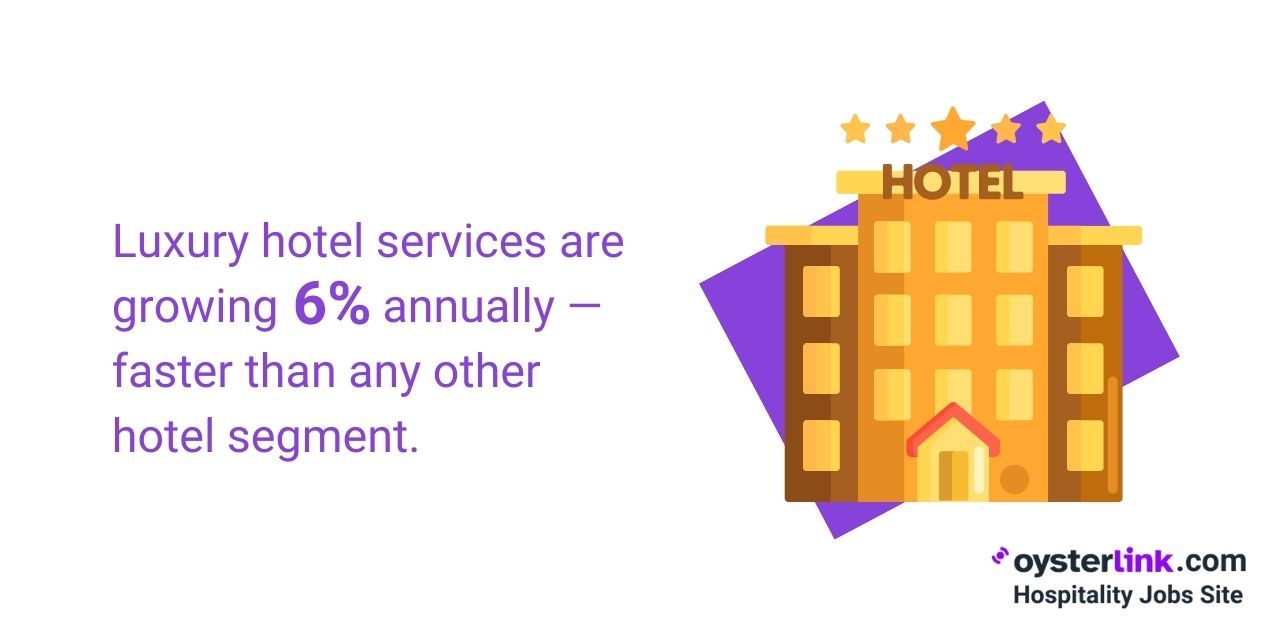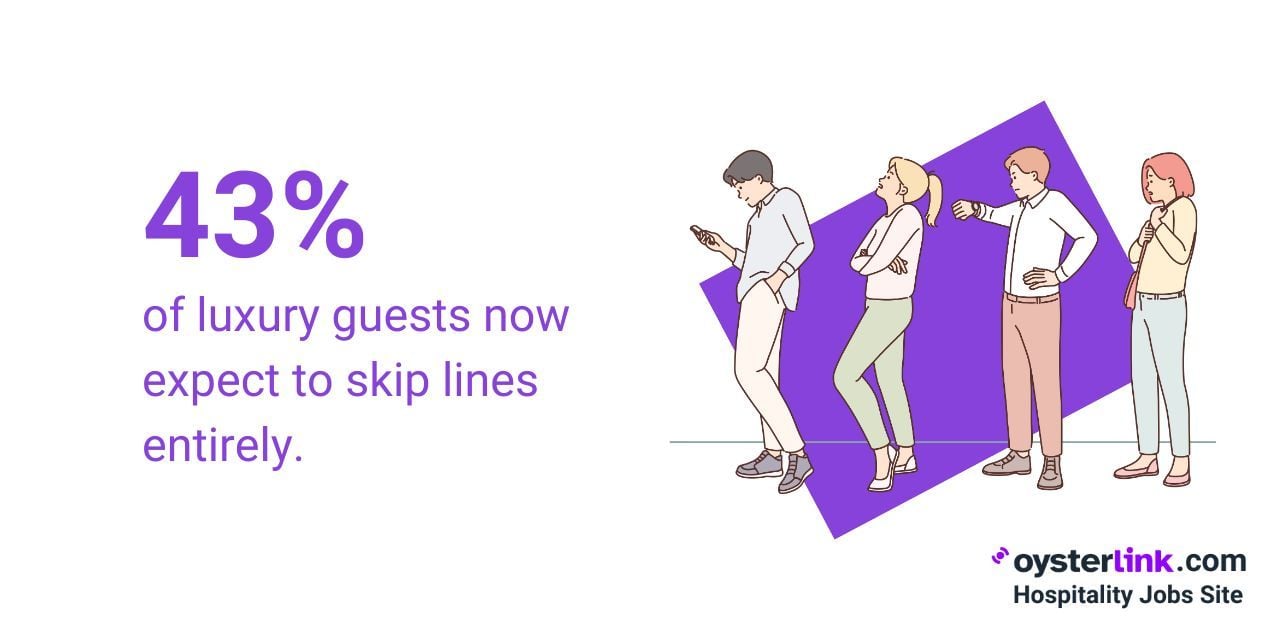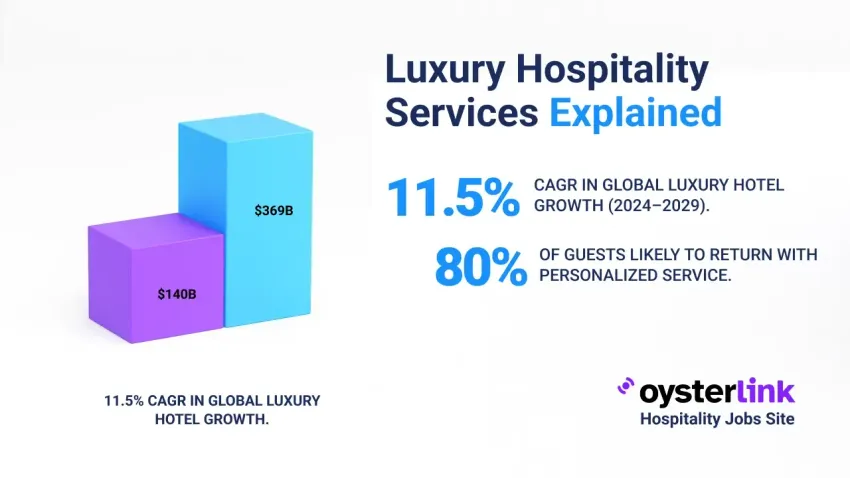This article breaks down how luxury hospitality services differ, what features define them and why they remain the benchmark for exceptional guest experiences.
What Is Luxury Hospitality?
Luxury hospitality delivers a memorable experience defined by exclusivity, refined amenities and exceptional service.
According to Fortune Business Insights, the luxury hotel market was valued at $140.28 billion in 2023 and is projected to reach $369.36 billion by 2032, growing at a Compound Annual Growth Rate (CAGR) of 11.5%.
This surge reflects rising guest demand for highly personalized, seamless experiences that go beyond the basics.
In these environments, guests don’t just receive service — they feel known. A Housekeeper may remember a returning guest’s preferred pillow type, while a Concierge might proactively arrange their favorite dinner reservation.
See also: US Hotel Industry Statistics for 2025
How Luxury Hospitality Differ from Standard Hospitality
Standard hospitality centers on efficiency and consistency. Luxury hospitality, by contrast, is defined by high staff-to-guest ratios, bespoke amenities and a curated atmosphere that supports privacy, comfort and emotional impact.
A McKinsey report notes that luxury hotel services are growing at 6% annually, outpacing all other hotel segments.

This trend underscores travelers’ shifting priorities — valuing thoughtfulness, flexibility and a sense of exclusivity over predictability.
Standard Hospitality | Luxury Hospitality |
| Efficiency-focused, consistent service | Anticipatory, highly personalized service |
| Uniform amenities, standard décor | Signature amenities, exclusive design |
| Average staff-to-guest ratio | High staff-to-guest ratio for responsiveness and privacy |
| Functional guest experience | Experiential guest journey with surprise-and-delight moments |
Key Luxury Hospitality Services and Offerings
Luxury hotels offer more than upgraded rooms — they deliver holistic, high-end hospitality services designed to meet each guest’s unique preferences. From dining to wellness, the goal is to craft exceptional moments across every touchpoint.
Concierge Services
Concierges manage everything from last-minute reservations to private tours or shopping. Recommendations are tailored to guest preferences and needs.
Pro Tip: When hiring a Concierge, look for candidates who know how to use Property Management Systems (PMS) to access guest profiles. Remembering a returning guest’s favorite welcome amenity or greeting them by name reflects the kind of service luxury guests expect.
Gourmet Dining and Culinary Excellence
Luxury hotels often feature Michelin-starred restaurants, celebrity Chefs and award-winning Sommeliers. Menus highlight local flavors and seasonality, with options for private dining, interactive Chef tables and custom tasting experiences.
Spa, Wellness and Recreational Amenities
Spas offer treatments that merge traditional techniques with modern wellness trends. Guests enjoy yoga, personal training, hydrotherapy and activities like golf or sailing, all adapted to individual schedules.
Pro Tip: Build in feedback loops and follow-up messages after spa treatments to encourage guest loyalty and repeat bookings.
Exclusive Accommodations and Suite Upgrades
Luxury suites offer space, privacy and elevated in-room features. Guests may find private pools, curated minibars and dedicated lounge areas ideal for relaxation or entertaining.
Pro Tip: During onboarding, train staff to explain suite-exclusive features confidently — this helps with upselling and reinforces the property's value.
Guest Experience in Luxury Hospitality
From booking to checkout, luxury hospitality delivers a seamless journey designed to make each guest feel recognized and valued.
Personalization plays a key role in this experience.
In fact, recent research shows that 80% of guests are more likely to return to properties that offer personalized services, while 75% are willing to share their preferences to enhance future stays.
These expectations aren’t just nice-to-have — they’re central to building loyalty in today’s high-end hospitality landscape.
See also: Top Hotel Brands in 2025 & What Sets Them Apart
Attention to Detail
Details matter. Addressing guests by name, remembering their coffee order or offering monogrammed linens turns a standard stay into a memorable one.
Staff tailor experiences using digital profiles and guest history, routinely recognizing milestones, preferences and special occasions.
Privacy, Security and Discretion
Privacy is a non-negotiable in luxury settings. Discreet check-ins, soundproof rooms and restricted-access areas protect guest confidentiality. Staff receive training on guest privacy, including handling VIPs and implementing strict social media protocols.
Pro Tip: Schedule privacy refreshers and review social media guidelines regularly to prevent information leaks.
Costs and Value of Luxury Hospitality Services
Luxury hospitality commands higher rates due to exclusive offerings and highly skilled staff. But its true value lies in the emotional impact — lasting memories and a sense of being genuinely cared for.
Understanding Luxury Price Points
Luxury hotel rates can range from several hundred to thousands of dollars per night, depending on location, season and inclusions like private transfers, spa access or Butler service. These properties also invest more in staff training, high-end materials and exclusive experiences, which contribute to their pricing.
Assessing Value Beyond Price
Luxury guests aren’t just paying for amenities — they’re investing in how a stay makes them feel. Emotional connection, recognition and seamless service create value that extends beyond the visit. Guests remember being known, not just served.
Pro Tip: Share guest testimonials that highlight emotional takeaways — this reinforces the real impact of great service and inspires consistency.
Trends and Innovations in Luxury Hospitality
To meet rising guest expectations, luxury brands are constantly evolving — combining tradition with innovation.
Sustainable Luxury Services
Eco-conscious luxury is gaining ground. From green architecture to locally sourced menus, sustainability now plays a major role in high-end hospitality. Many properties support community initiatives and environmental efforts without compromising service standards.
Pro Tip: Encourage staff to introduce sustainability efforts early in the guest journey — mention them at check-in or in-room, and reinforce them during staff onboarding.
Tech-Enabled Guest Experiences
Smart technology enhances comfort. In fact, 43% of luxury guests now expect to avoid waiting in lines entirely, which has made contactless check-ins and mobile concierge tools essential elements of luxury hotel services.

From app-controlled lighting to AI-generated recommendations, digital tools are reshaping the guest journey. Virtual concierge platforms, contactless check-in and augmented reality tours are becoming standard in luxury settings.
Pro Tip: Offer hands-on demos to build staff confidence with new tools — tech proficiency and human warmth must go hand-in-hand.
Best Practices for Training and Onboarding in Luxury Hospitality
Service excellence starts with structured training. New hires should understand what sets luxury apart from day one.
- Use side-by-side comparisons between luxury and standard hospitality to build intuition.
- Role-play scenarios like managing VIP requests, special diets or privacy-sensitive situations.
- Share “key takeaways” lists by department to support daily consistency.
- Highlight guest feedback to show how individual actions influence satisfaction and loyalty.
- Schedule recurring refreshers on digital tools, privacy and service recovery to reinforce core standards.
Luxury hospitality thrives on consistency, anticipation and emotional intelligence — make these the foundation of every onboarding program.








Loading comments...